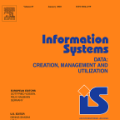In this paper, we study arbitrary infinite binary information systems each of which consists of an infinite set called universe and an infinite set of two-valued functions (attributes) defined on the universe. We consider the notion of a problem over information system, which is described by a finite number of attributes and a mapping associating a decision to each tuple of attribute values. As algorithms for problem solving, we investigate deterministic and nondeterministic decision trees that use only attributes from the problem description. Nondeterministic decision trees are representations of decision rule systems that sometimes have less space complexity than the original rule systems. As time and space complexity, we study the depth and the number of nodes in the decision trees. In the worst case, with the growth of the number of attributes in the problem description, (i) the minimum depth of deterministic decision trees grows either as a logarithm or linearly, (ii) the minimum depth of nondeterministic decision trees either is bounded from above by a constant or grows linearly, (iii) the minimum number of nodes in deterministic decision trees has either polynomial or exponential growth, and (iv) the minimum number of nodes in nondeterministic decision trees has either polynomial or exponential growth. Based on these results, we divide the set of all infinite binary information systems into three complexity classes. This allows us to identify nontrivial relationships between deterministic decision trees and decision rules systems represented by nondeterministic decision trees. For each class, we study issues related to time-space trade-off for deterministic and nondeterministic decision trees.
翻译:暂无翻译




